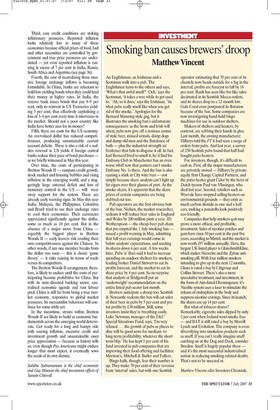Smoking ban causes brewers' droop
Matthew Vincent An Englishman, an Irishman and a Scotsman walk into a pub. The Englishman turns to the others and says, 'What's that awful smell?' Och,' says the Scotsman, 'ft takes a wee while to get used to."Ah, so it does,' says the Irishman, "tis what pubs really smell like when you get rid of the smoke.' Apologies for the Bernard Manning-style gag, but it illustrates the smoking ban's unfortunate consequences: as the Scots and Irish will attest, pubs now give off a noxious aroma of stale beer, missed urinals, damp dogs and damp old men and the flatulence of both — plus the industrial-strength air freshener that fails to disguise it all. In fact, had Bernard lived to smell it, he'd find his Embassy Club in Manchester has an even worse whiff now that punters can't smoke Embassy No. 1s there. And the ban is also causing a stink in City wine bars — not simply because share analysts can't light up fat cigars over their glasses of port. As the smoke clears, it's apparent that the share prices of certain companies are being stubbed out too.
Pub operators are the first obvious butt of the ban: Nielsen, the market researcher, reckons it will reduce beer sales in England and Wales by 200 million pints a year. JD Wetherspoon — the cheap-beer pub chain that pre-empted the 1 July smoking ban — issued a profit warning in May, admitting that full-year earnings would come in below analysts' expectations, and sending its shares down 6 per cent. A few weeks later, Pubs 'n' Bars said it had to increase spending on outdoor shelters for smokers, leading broker Daniel Stewart to cut its profits forecast, and the market to cut its share price by 4 per cent. So no surprise that analysts at Bridgewell put an 'underweight' recommendation on the entire listed pub sector last month.
Brewers anticipate a droop too. Scottish & Newcastle reckons the ban will cut sales of their beer in pubs by 5 per cent and pretax profits by £10 million Still, some investors insist they're breathing easily. Luke Newman, manager of the F&C Special Situations Fund, says, `I'm very relaxed. . . the growth of pubs as places to dine will be good news for mediumto long-term profitability, whatever the shortterm blip.' He has kept 5 per cent of his fund invested in pub companies that are improving their food offering and facilities: Marston's, Mitchell & Butler and Fullers.
Bingo halls, though, fear their number is up. They make 70 per cent of their revenue from 'interval' sales, but with one Scottish operator estimating that 70 per cent of its clientele now heads outside for a fag in the interval, profits are forecast to fall by 16 per cent. Rank has seen like-for-like sales decimated in its Scottish Mecca outlets, and its shares drop to a 12-month low. Gala Coral even postponed its flotation because of the ban. Some companies are now investigating hand-held bingo machines for use in outdoor shelters.
Makers of shelters and heaters, by contrast, are rubbing their hands in glee. Last month, the awning manufacturer Hillarys told the FT it had seen a surge of orders from pubs. And last year, a survey of 250 Scottish pubs found that half had bought patio heaters.
For investors, though, it's difficult to cash in. First, all the major manufacturers are privately owned — Hillarys by privateequity firm Change Capital Partners, and the patio-heater giant Calor by the heirs of Dutch tycoon Paul van Vlissingen, who died last year. Second, retailers such as Wyevale have stopped selling heaters on environmental grounds — they emit as much carbon dioxide as one and a half cars, making a panatella look positively eco-friendly.
Companies that help smokers quit may prove a more ethical, and profitable, investment. Sales of nicotine patches and gum have risen 50 per cent in the past five years, according to Mintel, and the market is now worth £97 million annually. Here, the largest UK-listed player is GlaxoSmithKline, which makes Nicorette and the Zyban antismoking pill. With four million smokers intending to give up in the next 12 months, Glaxo is rated a buy by Citigroup and Collins Stewart. There's also a more speculative treatment, and investment, in the form of Aim-listed Chromogenex: it's Nicolite system uses a laser to stimulate the release of endorphins in the body and suppress nicotine cravings. Since its launch, the shares are up 14 per cent.
But what of tobacco shares?
Remarkably, cigarette sales dipped by only 2 per cent when Ireland went smoke-free — and BAT is still rated a buy by Merrill Lynch and Evolution. The company is even diversifying into smokeless products such as snuff. If you can't really imagine snuff catching on at the Dog and Duck, consider Sweden. Snuff is hugely popular there — and it's the most successful industrialised nation in reducing smoking-related deaths. That's not to be sneezed at.
Matthew Vincent edits Investors Chronicle.



















































 Previous page
Previous page